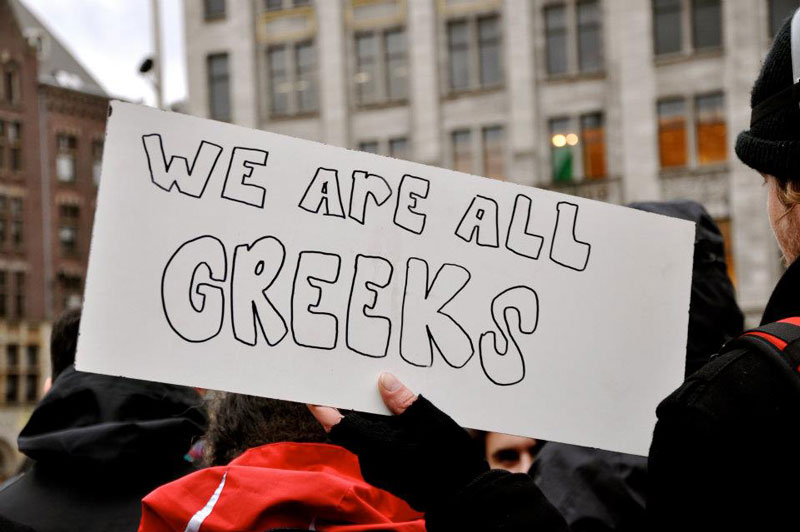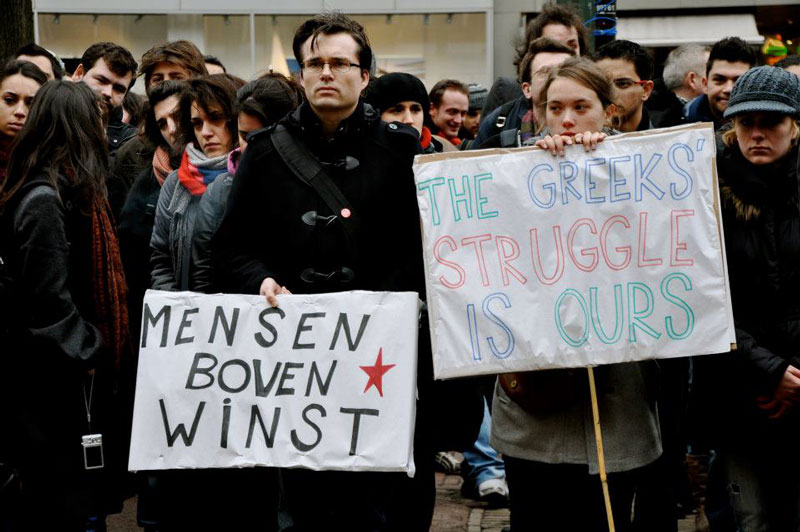Our man in Amsterdam
By Michael Marchman
It’s been a year since my partner, Stephanie, and I became international migrant workers. We moved to the Netherlands from Lexington last January after Stephanie was offered a two-year research fellowship at the University of Amsterdam. We were excited by the opportunity and not a little bit relieved. Stephanie had just completed her PhD and had been looking, unsuccessfully, for a job for over a year. And several months earlier, due to budget cuts and restructuring, I lost the teaching job that I’d had for four years at Northern Kentucky University.

Sign from Greek solidarity rally at the Beursplein in Amsterdam, February 18. Photo courtesy of our comrades REinFORM.nl
As an adjunct instructor working on a year-to-year contract with limited benefits, I was well aware of the precarious state of my employment. I knew that it could dry up at any moment. But being aware of your own economic insecurity doesn’t make it any easier to deal with the sudden loss of your job. So when my contract was not renewed after my fourth year at NKU, I found myself suddenly unemployed. To make matters worse, since I’d been hired on a fixed short-term contract (as so many of us working in higher education are these days) I wasn’t technically fired or laid off—my contract was simply allowed to expire. As a result, I wasn’t eligible for unemployment benefits.
For the previous couple of summers, I’d worked as an assistant to a local carpenter doing restoration and remodeling work to make ends meet. When I lost my job at NKU my carpenter boss—one of the finest human beings I’ve ever had the pleasure of knowing—offered me full-time work. I was grateful and thoroughly enjoyed the work. The friendship that I developed with him and my other co-worker are among the most treasured I’ve ever had. I wouldn’t trade the time I spent working with them for anything. In fact, I would have enjoyed continuing to work with them, but at $11 an hour with no insurance and massive debts to pay off, it was destined to be temporary.
With insufficient incomes, unstable employment, a horrendous job market, and a mountain of credit card and student loan debt gnawing holes in the linings of our stomachs, Stephanie and I struggled to control our anxiety.
Flight to Amsterdam
So when Stephanie was offered the job in Amsterdam, giving at least one of us a decent salary, not to mention the chance to live in Europe for a couple of years, we jumped at the opportunity. Despite real uncertainty about our ability to survive economically in Amsterdam—I didn’t have a job and her income alone wouldn’t be enough for us to survive on for long—we decided to go. We sold our cars, held a garage sale to make a little money and get rid of some of our junk, put the rest into storage (read: Stephanie’s parents’ basement), had a final drink with our Lexington friends, and set off for Europe—with a few thousand dollars and our fingers crossed.
After spending the first several months in Amsterdam looking unsuccessfully for work, watching our meager savings dwindle to nothing, and getting increasingly nervous about my lack of job prospects, I got extraordinarily lucky and landed a full-time teaching gig at a university in the south of the Netherlands. It was temporary and I’d have to commute but the pay was pretty good and it meant that we would, at least, be able to afford our outrageously high rent and not default on our debts back home.
When I was offered the job, we sighed a tremendous sigh of relief and our blood pressures returned to levels capable of sustaining human life. For the next six months or so, we were able to enjoy our lives in Amsterdam.
We really like it here. The city is beautiful and full of interesting things to do. We found a comfortable, albeit expensive, apartment, started making friends and having a social life, and when Occupy Amsterdam was established in October, I found an outlet for my political energies (and my occasional need to shout at the ruling elite through a bullhorn).
But, like our jobs, this stress-holiday turned out to be temporary. We now have less than a year before both of our employment contracts expire and we are right back in the exhausting and stressful situation of having to look for jobs in the midst of a brutal economic recession with no end in sight. We’ve been able to save a little money, but not enough to last us two months without work. Despite our best efforts to just roll with the punches, we’re feeling the anxiety mounting all over again.
I think, in the backs of our minds, both Stephanie and I believe that at least one of us will find a job somewhere either in Europe or the US and that it will be enough for us to get by on. But fuck, we’re in our mid-30s and we’re ready to be done with just barely ‘getting by.’ We’re fed up with having to look for new jobs every couple of years, with not being able to put away money for retirement, with wondering if we’ll ever be able to pay off our student loans, if we’ll ever have any job security, if we’re going to have health insurance this time next year, or if we’ll ever finally be able to put down roots in a place and be able to stay there for more than 24 or 36 months. We’re exhausted, we’re stressed out, and we’re pissed off.
We are not alone
We can’t stay in the Netherlands without work and the job market here is as tight as it is everywhere else. As the economic crisis in the Eurozone deepens, as the people of Greece, Spain, Portugal, Ireland, Italy and other peripheral European countries continue to get beaten down by inhuman levels of austerity and by police batons, the situation isn’t going to get better anytime soon. Migrants from the struggling European countries are flooding into the wealthier ones, driving down wages and increasing nationalist and anti-immigrant sentiments. Austerity measures are now being introduced here in the Netherlands, one of the wealthier European economies, and working people are beginning to feel the crunch. A sense of frustration and impending hardship is setting in.
So we know we are not alone. And we realize that millions (in fact, billions) of people around the world have it much, much harder than we do. We realize that our position as white Americans with advanced degrees means our prospects are better than those of many other people. But like so many others we feel like we’re living on the razors edge.
That’s why, for as long as I’m in Europe, I’m going to continue organizing and agitating here to demand an end to this vicious economic and political order that is screwing us by the billion. That’s why I am joining with my Greek, Spanish, Portuguese brothers and sisters in the streets of Europe and supporting them in their just and necessary struggle against the brutal austerity being forced upon us all so the European and American banks can continue their global campaigns of rape and pillage. And that’s why, when I eventually return to the US, I’ll be joining you in the streets, and in the public square, and outside the Chase Bank on East Main in downtown Lexington, or wherever it is that you happen to be raising hell and fighting to put a end to this brutal and inhuman system.
Love and solidarity from Amsterdam.





Leave a Reply